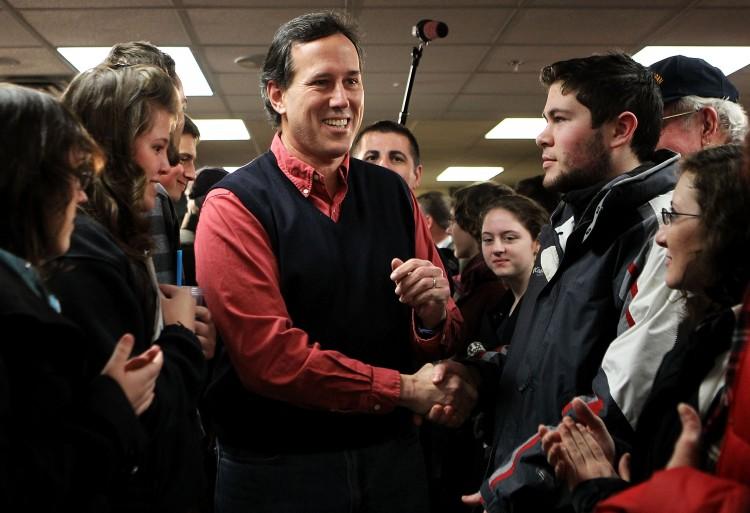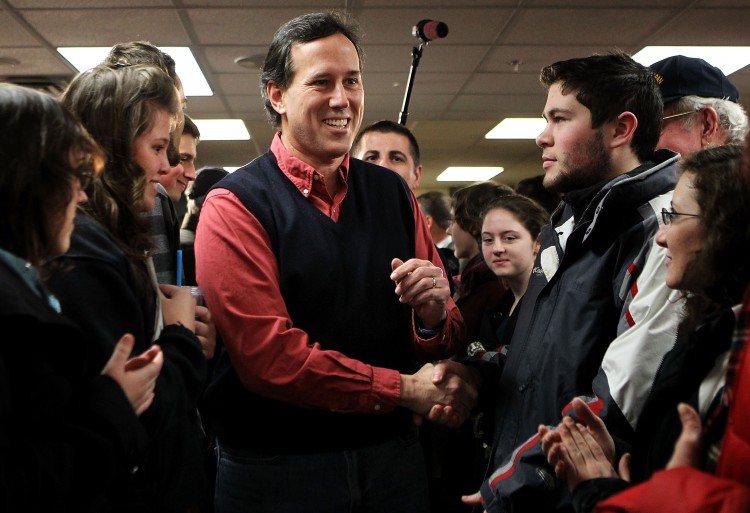The wheel continues to turn in the GOP presidential campaign, with former Massachusetts Gov. Mitt Romney edging out former Pennsylvania Sen. Rick Santorum at Tuesday’s Iowa caucuses, but without a convincing win to ensure a straight run for selection.
In the aftermath of Iowa, there were a couple of surprise moves. Minnesota Rep. Michele Bachmann announced her retirement from the race despite hinting that she would continue on the night of the caucuses. Meanwhile, Texas Gov. Rick Perry announced he will continue and declared he would retreat to Texas to assess his position, despite gaining only 10 percent in the Iowa caucuses.
Mitt Romney struggled to take the lead throughout the night in “America’s heartland,” with Texan Rep. Ron Paul at one point leading the pack as early votes came in.
Early Wednesday morning, the final results put Romney slightly ahead by 8 votes at 30,015 and 24.6 percent of the vote.
Rick Santorum was second at 30,007 and 24.5 percent. Ron Paul came in third with 21 percent, while Newt Gingrich fell well back with 13 percent.
Texas Gov. Rick Perry, who spent $4 million on Iowa, came in fifth with 10 percent of the vote. Disappointed, he initially indicated he would retreat to Texas and “assess the results” only to bounce back Wednesday, tweeting on his personal account, “Here we come, South Carolina.”
Rep. Michele Bachmann, despite being born in Iowa, was able to garner only 5 percent of the vote, taking sixth place.
Bachmann indicated Tuesday night she would initially continue, but conceded on Wednesday, saying the people of Iowa had spoken, “and so I have decided to stand aside.”
While the Romney camp is upbeat about the win, the former governor conceded it was not decisive.
“I think landslides are terrific,” Romney told reporters later that evening, the Washington Post reported, “I just didn’t see that in last night’s figures. I’m not sure about you.”
Romney campaigned hard in Iowa and won despite a much smaller roll-out than the 2008 election, where he was trounced by Mike Huckabee. He had ten times the staff in that campaign and spent $10 million. Political analysts were surprised at his razor-thin margin, however, and are divided over the extent of his success.
William Galston, political analyst with the Brookings Institution, says the result in Iowa was good for Romney, as the two real challengers, Newt Gingrich and Rick Perry, had done poorly. Galston believes Rick Santorum and Ron Paul have little chance of receiving the Republican Presidential nomination, leaving the field wide open for Romney.
“Romney is in a good position to win early and begin unifying the Republican party around his candidacy,” he said in an analysis of the Iowa caucuses.
Jonah Goldberg, author and blogger with the America Enterprise Institute (AEI) agreed, saying Romney achieved more with less this time, and on the numbers Romney looked good. Yet without a strong win, Romney still did not have the confidence of the majority of the Republican community, he said, noting Romney’s failure to fulfill his own expectations despite being a successful businessman and governor.
“He appears more like a man who can’t close a deal than he would have, had he come in a respectable second—but had declined to seem like he was competing at all,” he wrote on the AEI blog.
Romney looks good in the long run, however, polling 47 percent in New Hampshire. He has a growing list of endorsements, not only from over 61 lawmakers but also from the likes of New Jersey Gov. Chris Christie, South Carolina Gov. Nikki Haley, and on Wednesday, Sen. John McCain.
Next...Santorum Steals the Limelight
Santorum Steals the Limelight
But it was Rick Santorum who stole the limelight in Iowa. Remaining in the background while other presidential candidates—Bachmann, Perry, Herman Cain, and Gingrich—took their turn on center stage, Santorum had been quietly working the Iowa state.
“Game on!” said the underdog at a late night caucus speech Tuesday.
With an upfront and strong, socially conservative message, Santorum used little advertising, running instead a drawn out, old-fashioned grassroots campaign. Santorum’s down-to-earth, handshake style is believed to have resonated especially with rural Iowans.
The candidate had the smallest campaign budget of all—his entourage was made up of himself and a press aide traveling around in a Dodge Ram pickup, according to the NY Times.
Over the previous months, he visited 99 counties in the largely agricultural, economically secure state, and met with people in over 300 community meetings. Significantly, most of the precincts he visited supported him in the caucuses, delivering an astounding surge in numbers and setting the stage for a contentious battle with other candidates in the coming months.
Ron Paul too had been at work in Iowa. The Texas congressman with the Libertarian views garnered a majority of votes early in the night, at one stage leading the counts. In the end, Rep. Paul’s 21 percent came in close to the 22 percent support predicted by polls the previous week.
With a “Restore America” slogan, Paul has campaigned for reduced government, a non-interventionist foreign policy, and removal of the Federal Reserve and its “fiat” currency.
According to surveys done by the television news networks, Paul’s supporters were largely with independents and younger voters.
Newt Ready to Pounce
Newt Gingrich was the other surprise in Iowa, dropping rapidly from a double digit lead over Romney last month to fourth place.
Gingrich was not as active on the ground as the three leading candidates in Iowa, focusing on the GOP campaign late in the race, but he was notably seething as he blamed his decline on extensive negative advertising largely from a Romney PAC, and also from the Paul camp.
Congratulating Santorum on the Iowa results, Gingrich, who had early in the campaign said he would not indulge in negative campaigns, refused to congratulate Romney. He accused Romney on Tuesday of being a liar, then went on to refer to him as the “Massachusetts moderate,” and finally broke out to tell CNBC’s “Squawk Box” that Romney reached a ceiling of support at 25 percent and that was it.
“I’m always amazed at these arguments that he is more electable when, in fact, he can’t break out,” Gingrich said.
Two more debates are coming up in New Hampshire on Jan. 7 and 8. New Hampshire, South Carolina, and Florida are all due to vote consecutively over this month. With Gingrich all fired up, Paul on a roll, Perry plowing ahead, and Bachmann out—adding further weight to Santorum’s campaign—there may be plenty more twists and turns in the GOP race as the party seeks a standout representative.






